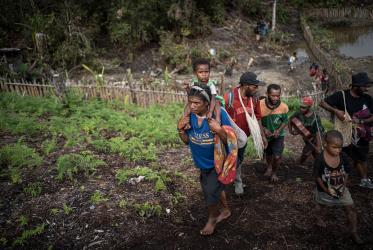The children were brought to Jesus in order that he might lay his hands on them and pray.
They were brought with hearts filled with hope and confidence. “Do not stop them” Jesus said.
Today, on World Children’s Day, let us think about the 28 million refugee children who are driven from their homes by conflict, migrating in the hope of finding a safer life.
Many of these children are dying on the way, out of hunger, cold or exhaustion.
Others are arriving in safe destinations but are still under shock for what they have gone through, and feeling lost.
250 unaccompanied minors are currently living in Geneva, in dire need of personal contacts.
Church communities represent a very important source of hope for these children:
In the Canton of Vaud, a “familles relais” system helps to provide a human contact for the children, not just an administrative one.
In many places churches organise playgroups and language classes and provide children with moral support (e.g. AGORA Geneva).
More support is needed to ensure that churches can really put the children at the center and help respond to those who suffer.
“Let the children come to me and do not stop them” is as important for a child growing up in a rich family in a safe country. But unfortunately, in many western countries, many children are growing up disconnected from their spiritual rooting.
They often face loneliness, some of them experience bullying at school, and the situation of many disrupted families makes it sometimes difficult for a child to find someone to speak to about their anxieties.
“Unless you change and become like children, you will never enter the kingdom of heaven.”
This verse also makes me think of Bonane, an 11 year old boy whom I met many years ago in Rwanda. His parents had both been killed during the genocide, and he was raising his 2 younger siblings all by himself, working on a banana tree plantation. When I asked him what gave him the strength to cope, he showed me a children’s Bible that had been given to him. And he told me that he prays every night, and that God was helping him every day.
The communication with God is missing in the lives of many children in our Western world. Surrounded by messages of consumerism, competition and materialistic values many children are not supported in their longing for a spiritual life.
I will never forget how I was struck by a newspaper heading when I returned from the Rwanda field trip. I had just spent time with that boy Bonane, who often did not know what he would live from the next day. His eyes were still filled with hope and joy.
And upon my arrival back in Geneva, the headlines were referring to the high rates of children committing suicide in some of the richest countries, like Switzerland and Japan.
Clearly, “let the children come to me and do not stop them” – giving children consolation, warmth and love, is as relevant at the time of Jesus as today. As urgent for children who are visibly suffering as for children who do not know how much they are loved, and that they can communicate with God through prayer any time.
“Unless you change and become like children, you will never enter the kingdom of heaven.”
When I read this passage today, I try to remember what it was, that was most different when being a child.
Children can, argue and fight, just like adults, they can scream very loudly – that’s not what is meant, for sure.
What resonates most with me when I read this passage is the notion of sensitivity of children. Janusz Korczak, in 1942, described it as follows: “The children’s thinking is neither more limited nor inferior to that of an adult. It is different. The child thinks with feelings and not with the intellect”.
We have a current example where children use both their feelings and their intellect, and what powerful impact this can have when they are taken seriously:
You may have heard of the 2 court cases which were initiated recently by children:
In the US, teens challenge the US government for not protecting them from climate change. Their complaint to the court refers to the permitting of oil and gas drilling and the export of fossil fuels as it "enhances the cumulative danger" caused by the government’s actions with regard to the environment.
In Norway, a youth organisation submitted a court case as new permits were granted for oil drilling in the Barents Sea last year. The teenagers stress that these are violating section 112 of the Constitution, which stipulates that the state should protect the nature and the environment for future generations.
I think that these are very strong illustrations of what we are told in the passage “unless you change and become like children, you will never enter the kingdom of heaven“.
And the energy which these children display, I think, also links to the anxiety which many children feel every day, in light of the state of our planet, and the way in which realities are conveyed to them through the media (on terrorism, natural disasters etc.). We need to accompany them in digesting all those news and maintain a positive outlook.
In this context, churches have a huge role to play in order to help children focus on solutions, rather than being paralysed by fear and distress. We need to preserve their potential and support their meaningful participation.
The “Churches’ Commitments to Children”, developed over one and a half years with 235 church representatives, including children, and child rights experts, were endorsed by the WCC Executive Committee in December last year and sent to all churches in March this year. Within not even three months we have received around 200 positive responses.
This brings a lot of hope in the areas of child protection, child participation and climate justice.
For example:
- Support to former child soldiers by a church in Uganda
- Prevention of domestic violence in Indonesia
- Young Climate Ambassadors in South India
- Early Childhood care centers for poor families in South Africa
In the midst of children’s every day dramas, this world where many parents are under pressure and lose their patience, this world filled with uncertainties - the Church is a rock, a shelter, a safe refuge, a fortress for many children. Let’s not disappoint them, and let’s remember the verse in Mathews “Let the children come to me”.
This reflection was presented during morning prayers in the chapel of the Ecumenical Centre 20 November 2017, following a reading of Matthews 18:1-5, 19:13-15.







